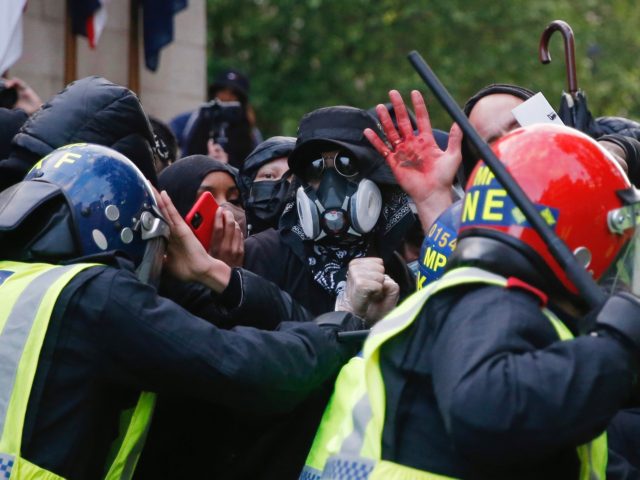Violent protests in England and Wales have risen by an astonishing 1,700 per cent over just 20 years, according to research conducted by the Police Foundation.
In 2019, 126 protests devolved into violent altercations — compared to just seven in the year 2000 — resulting in hundreds of police officers being injured and millions of pounds in property damage.
The violence at protests reached a fevered pitch last month when Black Lives Matter rioters clashed with police in London. Violent scenes were also captured on film by Breitbart London at anti-Brexit and Extinction Rebellion rallies over the past year.
The report from the Police Foundation, an independent think tank, found that the total number of protests has also steadily risen over the past decade, with 83 organised protests in 2007 compared to 280 last year.
“In any society, social tensions can erupt posing challenges of public order and a risk of harm. There are signs that such tensions have heightened in recent years in England and Wales,” the report stated.
The growing social tension in the UK was perhaps best typified by an anti-Brexit protester who wished Prime Minister Boris Johnson a “horrible death” at a protest-turned-riot in December of last year:
The violence at protests in the UK severely ramped up, however, following the death of George Floyd in America, which saw a resurgent Black Lives Matter UK street movement. In the first three weeks of the BLM protests, at least 140 police officers were injured in the London riots.
In one famous incident, a police officer was filmed walking away from a BLM protest with blood pouring from his face, as activists chased police, hurled projectiles, and screamed: “Run, piggy, run!”
Black Lives Matter protests-turned-riots also saw protesters punching police officers outside Downing Street, the headquarters of the British government.
At a separate BLM protest on June 5th outside Downing Street, a policewoman was thrown from her horse as the vicious mob hurled bicycles at the mounted police.
The violent scenes at the protest were captured on film by Breitbart London:
Kurt Zindulka / Breitbart NewsThe increasingly disruptive protest movements in the UK have also come with a heavy cost to the British taxpayer.
Last year, the eco-warrior activist group, Extinction Rebellion (XR), cost the Metropolitan Police at least £37 million, with £21 million spent during the so-called the group’s ‘Autumn Rising’.
The far-left group staged large-scale sit-ins on the city’s roads in London, glued themselves to the London Stock Exchange’s doors, the headquarters of Shell Oil, as well as to cars, lorries, and to supposedly ‘green’ public transport vehicles.
The two-week-long protest in the autumn of 2019 saw the climate alarmist group attempt to shut down the British capital city in protest against the so-called climate crisis XR believes is imminent.
The Metropolitan Police Commissioner, Dame Cressida Dick, said that chaos caused by Extinction Rebellion activists put a severe strain on police resources in London, which has been grappling with a crime wave under the leadership of Mayor Sadiq Khan.
The cost of policing the group was nearly double the total budget of the city’s Violent Crime Taskforce, which is only £15 million.
In February, a student-led “Climate Strike” protest in London saw Antifa and Extinction Rebellion violently clash with police, and attempt to shut down Westminster Bridge. At least three activists were arrested during the demonstration, which was caught on film here:
Despite the growing unrest, London Mayor Sadiq Khan has announced that he is planning to cut some £110 million from the budgets of the Metropolitan Police, the Mayor’s Office for Policing and Crime (MOPAC), and the fire brigade, among other public bodies.
The report from the Police Foundation warned that the growing number of protests have strained the resources of police forces.
Sir Michael Barber, the Chairman of the Strategic Review of Policing, said per The Telegraph: “For some time now policing has been wrestling with a tension between the rise of more complex crimes and social challenges and an operating model that was built for a different time.
“Whereas in the past the police could deal relatively straightforwardly with bringing offenders to justice they are now presented with a variety of problems, many of which require a social rather than a criminal justice solution and most of which cannot be tackled by a single agency but require extensive collaboration.”
Follow Kurt on Twitter @KurtZindulka

COMMENTS
Please let us know if you're having issues with commenting.